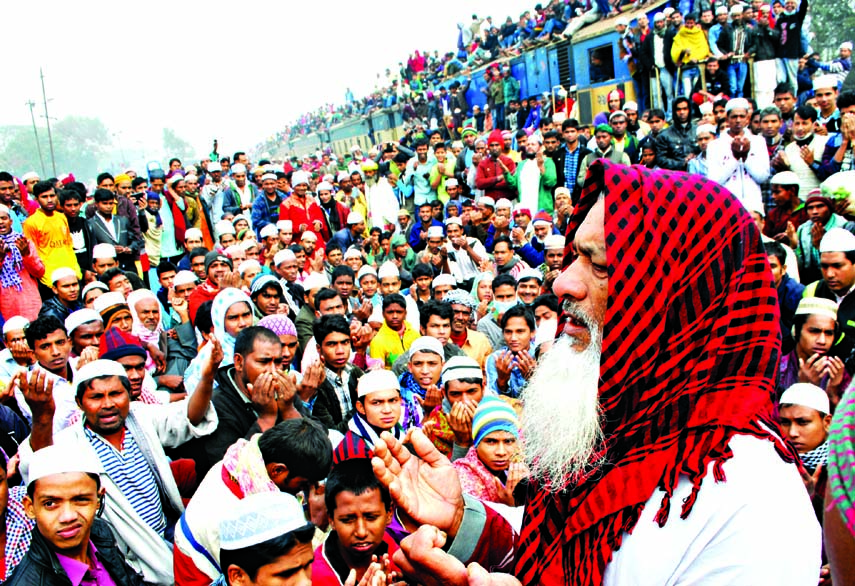
M M Jasim :
About 20 lakhs of Muslims sought world peace, forgiveness and divine blessings for mankind and the Muslim Ummah in the Akheri Munajat on conclusion of the first phase of Bishwa Ijtema on Sunday.
The Ijtema began on Friday on the bank of River Turag at Tongi in Gazipur amid countrywide non-stop blockade called by 20-party. Noted Islamic scholar Tablig Jamaat Sura member Maulana Sad from India conducted the Akheri Munajat at about 11am. Many people took position on the vehicles and boats and rooftops of residential buildings around the Ijtema venue.
The educational institutions, offices and factories nearby were also declared shut for yesterday due to the Akheri Munajat.
President Abdul Hamid joined the Munajat along with his family members from the Bangabhaban. Prime Minister Sheikh Hasina joined the final prayers from her Ganobhaban residence.
BNP Chairperson Khaleda Zia took part in it from her Gulshan political office, where she has been kept confined for the ninth consecutive day. Islamic scholars from different countries delivered sermons on various aspects of Islam.
Several lakh Muslim devotees, from home and abroad, converged on the congregation ground and joined the prayers and listened to religious sermons. The Bangladesh Railway arranged special trains from Akhaura, Comilla and Mymensingh districts on Sunday.
Shakhawat Hossain, Additional Superintendent of police (Traffic) of Gazipur, said that 40 buses boarded the devotees from Gazipur’s Bhogra Bypass to the Ijtema ground in the morning.
He added that some roads remained closed due to the Akheri Munajat for all types of vehicles except ambulances and police vans.
At least 10 people died during the first phase of the Ijtema due to cold, cardiac arrest and old age complications, our correspondent reports quoting police. Eight of the deceased were identified as Makbul Hossain, 75, and Toayazzel Hossain, 50, from Chuadanga, Sadequr Rahman, 20 from Sylhet, Abdus Salam, 50, from Gazipur, Jahangir Alalm Sarker, 65, from Dhaka, Kafil Uddin Mandol, 50, from Natore; and Khairul Kabir, 55, and Riaz Uddin, 52, from Kishoreganj.
Meanwhile, law enforcers picked up 17 people on charges of pick-pocketing and mugging. A mobile court also lodged 10 cases and realised Tk 13,000 from traders for sale of adulterated food.
Like previous years, dowry-free mass marriages were solemnised after Asr prayers on the second day of the Ijtema.
Muslim devotees from 32 districts of the country and 4,982 foreign nationals from 50 countries took part in the first phase Ijtema, sources at the district Special Branch of police said.
There were special arrangements to ensure security of the devotees amid the countrywide non-stop blockade enforced by the BNP-led 20-party alliance. A large law enforcement contingent ensured foolproof security of the devotees. Several watch towers were erected at the entrances to the Ijtema ground. Besides, a good number of close circuit cameras and a control room were set up for providing healthcare services to the devotees. The second phase of the three-day Biswa Ijtema will be held from January 16 to 18.
The Ijtema is held in two phases from 2012 to ease accommodation problem. The first Ijtema began in the capital’s Kakrail Mosque in 1946, the second one in Chittagong in 1948, and the third one at Tongi in 1966. The Bishwa Ijtema is held on the eastern bank of the Turag River since then.

